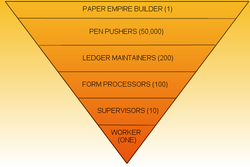HowTo:Build a paper empire
If you're reading this HowTo, chances are you have probably just been appointed to an "executive" role within an organization, on the strength of some ambiguous, waffly degree, or valueless "management training" certificate.
You will probably have noticed that the business of your department already seems to be handled pretty efficiently, even without a "manager" to oversee it. Records of work done are concise, uncomplicated and readable. They are kept using an efficient system which permits easy finding of information. You notice that customers are always attended to swiftly, and they actually look pleased when they leave. Figures also show your department to be one of the more profitable.
That, and of course, you're embarrassed to admit that as a "management studies" graduate, you don't understand even the first thing about the work your department does. In fact, you don't even understand why they do this work, or who for. Or anything.
In view of this you're not quite sure why a manager was hired, as your role seems to be a trifle superfluous. The situation has got you slightly worried. If the bosses figure this out at some point in the future, then you might no longer have a job.
If this is your situation, then a Paper Empire could be exactly what you need.
Objectives
The fundamental principle of the paper empire revolves around working procedures, and its objective is that of demonstrating to upper management the need for intervention and "management" of tasks performed in this department due to the self-evident failure of staff to follow the proper procedures of work. Then, of convincing upper management that you are performing the role of correcting these shortcomings to a very high standard of excellence. Successfully achieving these two aims should secure your position of high rank and esteem within the firm.
Principles
Getting Started
Take things easy to start with. One of your key priorities should be the building of an atmosphere of mutual distrust among employees
Don't go to far too soon. Introduce your paper empire gradually, starting with those items for which you have a very plausible sounding justification. In the early stages whilst staff camaraderie and enthusiasm still prevails, too rapid a growth in paperwork may lead to a mutiny. Once it has become the accepted norm for paperwork to be the primary role of all employees, then you can expand your repertoire with less risk of kickback.
One of the best starting points is to place a ledger book at reception, ostensibly to record the times when people arrive for work. (If there is no lateness problem in your department don't worry, you can always claim that it's targeted at some mythical habitually tardy employee in another department, but is being introduced site-wide as a matter of policy.) Since this sounds like a semi-reasonable requirement, you should not have much trouble gaining compliance.
You then progressively, stealthily extend the list of items to be filled in to include the date, the time, the vehicle registration, the chassis number, the mileage, the person they're going to see, their National Insurance number, the NI number of the person they're going to see, age and gender, and of course the phase of the moon. At the same time you demand that ALL persons entering and leaving the building at any time of day fill in this ledger, even if they're just stepping outside for a cancer top-up or suchlike. This can always be justified as being, "Required by Fire Regulations, so we MUST enforce it."
Once the principle has been established that everyone must scribble in this book every single time they pass the reception desk for whatever reason, or else get bawled out by the receptionist, you have cleared your first hurdle. It is now relatively easy to start introducing ledger books for other (pointless, timewasting) purposes throughout the building. It will also be gratifying to stand and watch the ever-increasing queue of people waiting to fill in and sign the book, and recognise the slowing effect this is having on the transfer of people and materials in and out of the building.
If your firm has company vehicles, the intuitive next step is to put a ledger into each of these, and demand that numerous details are recorded every single time the vehicle is driven. This can be explained as a tax requirement, if there are still a few questioners at this stage. You will then have the gratifying sight of vehicles stationery in the yard, drivers hunting for pens, briefcases, watches and calendars and then sitting for ten minutes, scribbling furiously.
From this point on, you can expand your empire into other areas such as ordering, sales, delivery and accounting. Ensure that all major departmental activities are logged in ledger-books, AND also recorded on forms. When designing these forms, pay particular attention to not only the complexity, but also the uselessness of the information therein.
Controlling Efficiency
It is painfully obvious to you that the excess level of efficiency in your department leaves no room for you to exercise the managerial skills which you have been trained to perform. (and which are in fact the only skills you have been trained to perform.)
Thus, you must find ways to replace efficient working practices with less efficient ones. Yet, at the same time you must provide those in your charge with credible justifications for these changes to working practices.
Time Allocation and Control
The introduction of additional, seemingly pointless writing tasks to the work schedule is effective in two ways; it will slow the work to a more acceptable pace, and it will also bring about a reduction in the excess morale presently being demonstrated by staff. This will bring about a further reduction in throughput, and also create quality control issues. Both will, of course, create scope for you to exercise your managerial skills to good effect.
Be especially vigilant over timekeeping, and the speed with which work progresses. Remember that a rushed mess of a job always leaves you with room to criticise and to manage, whereas a job done properly to a sensible timescale does not. Therefore, maximizing the paperwork element, whilst also compressing the job timescale to as short an interval as humanly possible, will ensure that staff have to work at frenzied speed, and consequentially will make many mistakes. One of the best ways to achieve this is to always "sit on" jobs until a scant few days before the completion date, then announce the job to the workforce in a tone of panic. This will keep staff "on their toes"—and will also make the apparent need for a person with management skills even greater.
Manual Skills Development
By now, you should have a team of analysts cataloguing all aspects of your worker's activities, right down to individual hand-movements, footsteps, spoken words, and facial expressions. From this research the "work procedures" are drawn up as detailed checklists, each individual hand-movement, expression or word spoken being ticked off on the checklist as it is performed. This ensures absolute uniformity of work. It also keeps 200 of your buddies in a job, of course.
Hand Duplication—the "biro Xerox"—is another very good way of soaking up surplus staff time. If information of this kind needs to be transferred from one place to another, then you should structure the information such that this has to be done manually in handwriting, and not by automated means. Naturally you will also have a procedure in place which requires all stages of a document's hand duplication to be recorded on a checklist.
Fine-grained Management
Forget about nonsense like monitoring standards of production or customer satisfaction, and concentrate on quality control of paperwork. The standard of the reports you submit to upper management is what counts toward your promotion.
As the next stage of advancement of your imperium, direct your staff report to you in person and sign a book in your office every single time they perform an action, no matter how trivial that action. As well as wasting huge amounts of time this will bolster your own authority.
Log, log, log, log, and then log some more. In line with the Procedures you have implemented, make staff record every single stage, every single action of work in minutest possible detail. However, when implementing this, do ensure that the information recorded is functionally useless and cannot, for example be used to expedite a reply to a customer's enquiry.
Don't worry about or berate poor workmanship. That is unimportant. Instead, be especially ready to chastise staff who fail to fill in paperwork correctly. Your aim here is to make the paperwork the principal concern of the business, all other activities being of secondary importance.
To summarize this section, the spirit of trust, enthusiasm and camaraderie you see among the workforce is a key issue for you to solve, as this tends to negate the need for micromanagement. To overcome this, your first and most important requirement is to get staff logging and recording their every action, no matter how trivial. The importance of this implementing this step as a first stage in paper empire development cannot be understated. Then, once this has been implemented, set them to monitor the records kept by their associates, actively seeking out discrepancies in their paperwork. Reward those who spot the tiniest paperwork discrepancies or omissions made by their peers.The overriding message you should project onto staff is this: no one trusts you, and every last one of your colleagues is eager to do just one thing—stab you in the back. This will soon dispense with the camaraderie problem and have them at each others' throats. You are then in an ideal position, poised to step in and manage.
Justifying Paperwork
Use standard, well-worn cliches to justify the changes you make to working methods, changes which involve mountains of additional paperwork and vastly reduced efficiency. "Health and Safety", "Accessibility" and "Human Rights" used to be the favorites, although in recent years "Carbon Tax" has overtaken them as the most popular. If you can make an argument that you are helping to save the planet at the same time as building your collection of 100,000 boxes of used paper, that is all the more credible with upper management. Prominently display a few "hockey stick" graphs in your department to reinforce this point.
Once the all of basic paperwork has been established, these excuses create the opportunities for adding risk assessments, human rights assessments, equal opportunities assessments, political correctness assessments, environmental assessments and carbon-con assessments to every job.
Tools and Media
The form and the ledger-book are your friends. Both have their key advantages. Forms enable you to require that all kinds of irrelevant and inane questions be answered. Preferably these questions should be structured so as to confuse the writer into making mistakes, for example asking for an address in one box, then asking for the zip code in an entirely different section. When designing a form, always ensure that boxes are too small for handwriting of standard size. The need to cramp will lead to wasted time calling up to find out what it says, and of course to mistakes. This is all good.
Once you have established the principle that staff will grass on each other for not filling in paperwork, the rapid expansion of your Empire becomes relatively easy.
One disadvantage of the form is that it is portable, and therefore can be taken to the place where the information is to be recorded. Ledger books do not suffer this limitation, Placing a ledger in a specific location requires everyone performing the task recorded in this ledger to go to the ledger in order to fill in the details. Since the details will invariably be complex, this will probably also mean the need to write down the information twice, once on a scrap of paper to take to the ledger, and then in the ledger itself. From now on, you will probably have to dodge staff as they run to-and-fro around the building, scribbling in each successive book, each of course strategically positioned at opposite ends of the site.
Ledgers are also proof against that tech gadget most feared by the paper empire builder: the document scanner. An enterprising employee may sneakily scan a form to avoid hand-copying the information on it, but a ledger will not fit through the mechanism and thus is more or less proof against this kind of illicit circumvention of paperwork.
Self-carbon multipart forms might seem at first to be counterproductive to paper empire building, but in fact these allow for a fair amount of creativity. Firstly, why not impose a requirement that instead of one copy of a form being put into a tray, four or six copies have to be put into different trays strategically placed at maximal distances all around the site? Naturally, at each tray there will be a ledger, into which selected details from the form have to be copied, by hand. Then of course, there is nothing in principle to prevent you from requiring that each copy should have some information different from the rest. The possibilities for soaking up employees' time on these sorts of task are quite literally only limited by your own creativity.
Staffing
Choose staff carefully. Paperwork should be their sole area of skill. Be specially cautious of applicants with "Time and motion analyst" credentials as these are likely to sabotage your Empire.
Right now, your department's staff probably consists of you, an overseer or foreman or two, some drivers, and maybe 10 to 50 shop-floor workers. This represents a serious imbalance of skills, and over the course of time you need to seek to correct it. Realistically, you should aim to recruit at least ten times as many office staff as work in other roles. Twenty times is even better. Your ultimate goal should be to have around a hundred office staff under your command, and one shop-floor worker. Naturally, before you can reach this ideal situation, though, you will need to generate sufficient paperwork to keep your hundred office staff busy. You will also have to systematically reduce the throughput of other types of work to the point where one person can handle all requirements. This may take some thought and creativity on your part.
Dealing with Customers
For those of us in a management role, the customer is a necessary evil, but one which we have to live with. Best way to deflect these annoying personages away from your office is to insist that a form is filled in for every enquiry, whether in-person or by phone. Ensure that this form demands as many embarrassing or revealing pieces of information about the customer as possible. However, ensure that the form does NOT record the customer's address or phone number, as that would give them an excuse to expect you to contact them. Also, in service trades, ensure that nothing on the form tells staff what the customer actually wants done, staff must guess at this for themselves. Then, with form filled in, the customer must be told to wait whilst their job record is found. This may take a while. A long while of hunting through boxes and boxes of forms. With luck they will have given up and gone away by the time you return to the desk.
If a customer starts complaining about slow service due to excessive paperwork, then of course you respond by saying that their complaint will be considered by management, but only if a complaint form is filled in.
Meanwhile, if a customer asks any technical-sounding question, simply use the stock reply of, "But I don't understaaaaaaaaand!" After all, you are a manager. You are supposed not to know such things.
Using Technology
At first sight, technology is the anathema of the paper empire. Computers, telephones, websites, PDA's and other gadgets have the potential to replace the paper component of job management entirely, with one of catastrophically-high efficiency. And, more importanly one which you haven't a monkeys of a clue how to use, let alone manage. Yet, their introduction should be seen as an opportunity, not a disaster. Again, it's really up to you to engage your creativity, and find ways to make these devices enhance your working practices instead of streamlining them.
The Computer
Have IT replace all copies of XP, 7, MacOS, or Linux with Windows 8. This will control the problem of excess efficency.
Firstly, the computer. Ostensibly, the archenemy of the frenetic pen scribbler. Now, in your ignorance you probably thought that this thing with a keyboard and printer looked a lot like a typewriter.You are right about that similarity, and in fact the computer fulfils this role admirably. Just ensure that staff don't get any clever ideas like using the thing to "store data" or such like, and you are fine. Make it clear that anything typed is to be printed, but not saved. If it's needed again, simple, they type it in again from the printed form. What is hard about that, I ask?
Then again, even if the geeks in your department decide to write a "database app" or suchlike nonsense, this need not disrupt the inefficiency of your paper empire. Simply insist that from now on, all information is entered into the database, AND into the paper based system. A computer employed in this way provides a very effective means of doubling the amount of work involved in recording information. This can be taken a stage further, by requiring that for each job, a form is first printed at the computer, then this form is taken to the shop floor or worksite and filled in. It is then returned to the computer and the information on the form typed into the database. Finally, this information is printed out on multipart copy, the copies separated and delivered to separate trays throughout the building. At each tray, the form details are of course also copied into a ledger. Always remember: A computer is a tool for generating paperwork.That is its design purpose.
Other aspects of computers lend themselves to the furtherment of your paper empire. For example, much of the software on a computer requires to be licensed, and keeping track of how many licences are in use is of course best done the traditional way, handwritten into a ledger book.
Malware and Trojans are a constant problem, requiring IT staff to make regular checks for any suspicious or unrecognised processes running on the computer. To facilitate this task, you should require the user to document each executable file on its hard disk in a ledger kept with the computer. This ledger should record the file's name, which software it forms a part of, who installed the software, what compiler it was built with, who wrote the sourceocde, the astrological birth sign of the coder's second cousin, etc etc. This exercise has the potential to keep the user busy for the forseeable future. And, if the user does eventually proudly proclaim, "I've done it!" you just produce a Windows 7 CD from behind your back, grin, and say, "Upgrade time!"
Tinkering can be productive too. Although you know squat about computers, that need not dissuade you from "having a go." For instance, if your computer stops delivering your daily dose of pornographic images and video, just breeze into the server-room, past the IT staff, as if you owned the place, and press every button you can find. One of these buttons will reset the Internet router, and bingo you're back online. The other buttons? Well, who cares about a few lost documents? They can write them again. Keeps them busy.
If the Board suggest a change of company name, use Google to find a domain registrar. Any registrar, doesn't matter which or where. SomaliaDomains.com will do just fine. Register all of the TLDs matching the new identity they're thinking of using. Register them in YOUR name, of course, not the company's. Remember good security policy, now—make sure you use a password with at least 327 punctuation characters in it. No, don't write the password down, that is BAD! Instead, ensure that you forget both the password and the registrar's name. This will ensure the maximum possible security from tampering with the new domains. The bosses are bound to thank you for this. The IT department may not, though, and we suggest you keep well out of their way for a while afterwards. OK, forever afterwards. But then, remember—no one can criticise you. You are a manager, for God's sake. You don't have to know squat. And, at no time do you have to account for your actions.
The Telephone
Ensure that your desk phone is the only one with a display. You don't want staff to know who is making those incessant calls, now do you?
Phones might also seem like a bad idea in Penpusher Land, but they too have their valuable uses:
- Deterring visitors to your desk
- If a staffmember comes to speak to you, surreptitiously call your desk phone from your mobile so it rings. Hang up the mobile and pick up the deskphone. Then, shout your visitor down as he or she greets you, and engage in a lengthy, bogus call. With luck, the visitor will get hacked off and leave the room after an hour or two.
- Boss convincer
- If the boss pops in to see how how much work you have in hand, make a prearranged call to a complicit member of staff. Stand there shouting "UH HUH ... YES ... UH HUH ... OF COURSE ... RIGHT ... OK ... YES ... YES ... YES ..." over and over for 15 to 45 minutes, while your compatriot does likewise. The boss will be convinced that you are both working extremely hard, and have both just secured a deal.
- Controlling competing sales
- If a rival department's sales look like they're getting out of hand, go into the sales department in question with a mobile, stand in the middle of the room and yell nonsense into it for a couple of hours. This is bound to make it hard for the guys to take down orders.
- Ensuring impoliteness by rival departments
- Send one of your own staff into the department in question, and immediately on their arriving, dial an extension in that department and say that you URGENTLY need to speak to the employee you just sent there. Your employee should have been briefed to shove his arm right across the guy's face to grab the phone from him, and then stand there yelling nonsense into it for the next half-hour.
- A variant on the above is to have your employee go to the vicinity of the rival department, but not enter. Then ring the first phone in that department, and demand, "IS RICHARD THERE??" When the answer comes back "no," swear or make innuendos, then slam the phone down. Now call the second extension in that department. Repeat, "I WANT TO KNOW IF RICHARD IS THERE!!!" and bang the phone down when told "no." Repeat the process for each extension in the department. For a spot of diversity, you can "tinkle" some of the extensions, allowing them to ring only enough to cause someone to down-tools and head toward the phone before it falls silent. After the last extension has been rung, arrange for your employee to enter and demand to know why he wasn't told that his manager was calling.
- Wait a few minutes, and repeat the whole process.
- With luck, the next call your rival department receives will be from a client wishing to confirm an order. The client will of course be greeted by "GET TO F*CK, PHONE PEST!", followed by a BANG, then a dialtone, as the handset is smashed to smithereens on the desk.
- You can now go ahead and call upper management, and accuse the rival department of being rude to clients.
- Micromanaging service visits
- If a tech has to visit a client's site to do maintenance or repairs, inisist that the tech call you on arrival, ostensibly to keep tabs on the time of arrival. Make it absolutely clear that work must NOT be started until the call has been made and the time of arrival logged. When the tech calls in, ignore it and let it ring. Whatever happens, you are now in a win-win situation. If the tech waits all day then returns without doing the job, berate him/her for showing laziness, unintelligence and a total lack of initiative. If on the other hand the tech decides to press on, regardless, and completes the work, then accuse him/her of having blatantly disobeyed the instruction to phone you before starting work, and file a misdemeanour report-of-insubordination.
Once you have mastered the basics of using an internal telephone system to support the objectives of your empire, you can then take it to the next level—a telesales operation. This should need no explanation.
When used in these ways, it will be seen that the computer, telephone and other tech gadgets can form useful adjuncts to the primary tools of the aspiring paper-empire builder.
Storage Requirements
Your paper empire will have one principal product. Paper. Vast amounts of it. This raises questions as to what to do with all those useless forms that no one will ever look at again (and, in fact, has never looked at). Special boxes are available, and you should order a few. On second thoughts, make that plenty. As to where to put these boxes, you obviously don't want them cluttering your own tidy, minimalist office. Be creative here, and try to find ways of sneaking them into other departments' storage areas. A favorite location is the IT department, especially the room where they keep the servers.
See if you can sneak in there out-of-hours, and pile a stack of boxes anywhere you can, like on and around servers, on top of electrical racks, and so on. This will block the ventilation and consequently increase the likelihood of the whole lot overheating and going down. Which is good. With luck, the paper might even start a fire, in which case you can claim insurance. For the lost paperwork, of course. Who cares about the damn computers?
Recycling
We don't do that. Listen, a paper-empire builder never destroys any paper. Paper is sacrosanct. When the building is completely full of paper, to the point where not one inch of space remains unoccupied.. we get a new, bigger building. And, keep the old one for storage. Paper storage, that is.
Expanding your Horizons
Once you've mastered the running of a paper empire internally within a business, you might like to consider expanding into the public sphere. The key attraction here is the opportunity to have the general public fill in vast numbers of forms for your underlings to process. A job in local or national government will most likely suit your specialized skills. Ultimately, you should aim for that holy grail, the mother of all of paper empires and the penpusher's wet dream: managing a National Census.
Dangers
Bankruptcy.
Creative use being found for size 10 boot, attached to foot of boss.
Getting Help
Several organizations have assistance schemes for the aspiring paper-empire builder:
- The European Union (Highly recommended)
- Inland Revenue
- HM Customs and Excise
- HM VAT Inspectorate
- IEE Wiring Regulations
- Civil Aviation Authority
- Ministry of Silly Walks
| Featured on the 5th of March 2011 | |
This HowTo has been featured on the HowTo: namespace. Want to know HowTo get your own HowTo featured? Just write something good.
| |
| Featured version: 8 July 2012 | |
| This article has been featured on the main page. — You can vote for or nominate your favourite articles at Uncyclopedia:VFH. | |












